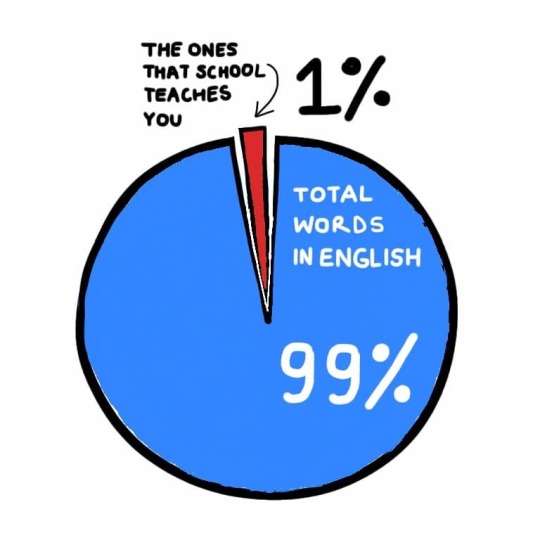#wordroots
Explore tagged Tumblr posts
Photo

𝗗𝗼 𝘆𝗼𝘂 𝗸𝗻𝗼𝘄 𝗵𝗼𝘄 𝗺𝗮𝗻𝘆 𝘄𝗼𝗿𝗱𝘀 𝘀𝗰𝗵𝗼𝗼𝗹 𝘁𝗲𝗮𝗰𝗵𝗲𝘀 𝗯𝘆 𝘁𝗵𝗲 𝗲𝗻𝗱 𝗼𝗳 𝗰𝗹𝗮𝘀𝘀 𝟭𝟮? 🤔 The larger your vocabulary↓ The more comfortable you are with books↓ The better a student you become! So shouldn't it be the business of schools to teach as many words as possible? After all, 𝘁𝗵𝗲𝘆 𝗴𝗲𝘁 𝟭𝟮 𝘆𝗲𝗮𝗿𝘀 𝘁𝗼 𝗱𝗼 𝘁𝗵𝗶𝘀! 😑 That's a very long time taken to mess up!😔 𝗘𝗻𝗴𝗹𝗶𝘀𝗵 𝗶𝘀 𝘁𝗵𝗲 𝘄𝗼𝗿𝗹𝗱'𝘀 𝗹𝗮𝗿𝗴𝗲𝘀𝘁 𝗹𝗮𝗻𝗴𝘂𝗮𝗴𝗲! It has a million common, non-technical words! Seriously. 1 million.😮 𝗛𝗼𝘄 𝗺𝗮𝗻𝘆 𝗱𝗼 𝘆𝗼𝘂 𝗸𝗻𝗼𝘄? 😎 ___ Well, 𝗺𝗼𝘀𝘁 𝗜𝗻𝗱𝗶𝗮𝗻𝘀 𝗸𝗻𝗼𝘄 𝗮𝗯𝗼𝘂𝘁 𝟭��,𝟬𝟬𝟬! 😮 & , we have no time left to waste! To make it easier for you we've created a 25% Scholarship on your Logophilia Vocabulary Masterclass! 😍😍😍 To get in, click on: www.logophilia.thinkific.com ___ 𝗚𝗲𝘁 𝘁𝗵𝗶𝘀 𝗼𝗳𝗳𝗲𝗿 𝘄𝗵𝗶𝗹𝗲 𝗶𝘁 𝗹𝗮𝘀𝘁𝘀! __ If you didn't hear it the first time, we'll say it again, & again, & again! 𝗟𝗢𝗚𝗢𝗣𝗛𝗜𝗟𝗜𝗔 𝗜𝗦 𝗡𝗢𝗪 𝗢𝗡𝗟𝗜𝗡𝗘! 😎 𝗬𝗢𝗨 𝗖𝗔𝗡 𝗡𝗢𝗪 𝗦𝗧𝗨𝗗𝗬 𝗪𝗜𝗧𝗛 𝗨𝗦! 😍 We're starting off with the most sold programme in Logophilia history - 𝗧𝗵𝗲 𝗟𝗼𝗴𝗶𝗰 𝗼𝗳 𝗘𝗻𝗴𝗹𝗶𝘀𝗵 𝗪𝗼𝗿𝗱𝘀! This is the most detailed introduction to English Vocabulary imaginable! ___ "But, we've already done this in school! 😮", you say? We agree & disagree. Logophilia online programmes are 𝘄𝗮𝘆 𝘀𝘂𝗽𝗲𝗿𝗶𝗼𝗿 to classroom programmes because: 𝗔. These programmes are videos. You can 𝗥𝗲𝗽𝗹𝗮𝘆 them! Over and over again, as many times as you want. 𝗕. These programmes are 𝗘𝘅𝘁𝗿𝗲𝗺𝗲𝗹𝘆 𝗗𝗲𝘁𝗮𝗶𝗹𝗲𝗱; not bound by the strict time-limits imposed by schools. 𝗠𝘂𝗰𝗵 𝗠𝗼𝗿𝗲 𝗖𝗼𝗻𝘁𝗲𝗻𝘁! 𝗖. These programmes are 𝗦𝗲𝗹𝗳-𝗽𝗮𝗰𝗲𝗱. You don't need to be rushed by the quick kids in class, or bored by the slow ones. ____ Credits @pre_yanshi_42 2020 © Logophilia Education #Logophilia #Etymology #Vocabulary #onlineprogram #worldslargest #languagedevelopment #schools #onlinecourses #1percent #99percent #globallanguage #dictionarycom #masterclass #latinwords #greekwords #wordroots (at Allahabad, India) https://www.instagram.com/p/CFKnB2Mp6eJ/?igshid=1di3g7re55o1y
#logophilia#etymology#vocabulary#onlineprogram#worldslargest#languagedevelopment#schools#onlinecourses#1percent#99percent#globallanguage#dictionarycom#masterclass#latinwords#greekwords#wordroots
0 notes
Text
In honor of just how epically my Russian name post blew up, here’s how you can make up your own Russian names
To be clear, most actually used Russian names are borrowed from Greek or Hebrew and Russianified, so the names you make up by THIS method won’t be common or occasionally even pre-existent. This is for when you want to make up a fantasy not-Russia that’s still clearly Russian in language but doesn’t have the same greek-borrowing history. It’ll sound antiquated, alt-history, slightly weird and definitely Russian as all heck.
Set of first halves:
- Vladi (means “power/ownership”)
- Yaro (means “passionately”)
- Veli (means “great”)
- Sviato (Svyato) (means “saint/sacred”)
- Miro (means “peace/world”)
- Meche (means “sword”)
- Tverdo (means “hard” as in “not soft”)
- Gordi (means “pride”)
- Bole (means “pain”. no i dont know why this one gets used either)
- Gore (means “grief/bitter”, see above)
- Slavo (means “glory”)
- Sveto (means “light”)
- Milo (means “dear” or “lovely”)
- Yasno (means “clear”)
- Vero (means “faith”)
- Liubo (Lyubo) (means “love”)
- Kraso (means “beauty”)
- Rado (means “joy”)
- Vole (means “will”)
- Zare (means “dawn” though the wordroot can also refer to dusk when specified. it specifically means the thing when its brighter in the sky than not in the sky. What you see when there’s a city or a bright fire in the distance is called a word produced from the same root)
- Vedi (means “knowledge��; note: I just made this one up, I have never seen an actual name with this. However it fits the scheme and will sound reasonable to a native speaker, and the goal is still to produce NOT common names)
- Zvezdo (means “star” and I made this one up too)
- Ogne (means “flame” and I might have seen this one or I might have made it up idk at this point)
- Snego (means “snow” and i 100% made this one up and its not a thing. Sounds nice though)
- Deye (means “action” and I’m only half certain this one’s a thing. It’ll definitely sound nice though, again)
- Medo (means “honey” and we’re completely off the rails here folks)
- Isto (means “sincerity” and im ALMOST sure this one is a thing. Almost)
- Pravdo (means “truth” and this one is 100% not a thing but it can be if you want to)
EDIT: CONTRIBUTION FROM @reaty CANT BELIEVE I FORGOT FUCKING STANISLAV
- Dobro (means "good" or "kind")
- Rati (means "army")
- Brati (means "brother")
- Vse (means "all")
- Zlato (means "gold")
- Liuto (Lyuto) (means "fierce")
- Stani (means "war camp")
EDIT: more contribution from @archtroop
- Diko (means “wild”)
- Bogo / Bog (means “god”) (usually would be “Bogo” but “Bogdan” and “Bogdana” are pre-existent)
- Vieche (means “age”, “era” or “century”)
Set of second halves:
- mir or mira (male/female respectively)
- slav or slava (same)
- bor (just male) (means "struggle" or “deep dark forest”)
- dar (just male) (means “gift”)
- mil or mila (again same) (see above for meaning)
- lad or lada (same and means “harmony”)
- liuba (lyuba) (just female; adding this in the male form just makes a regular word that means ‘[thing]-lover’, like “slavolyub” -> guy who likes glory)
- rad or rada (see above)
- slov (means “word”)
- ust (means “mouth”)
EDIT: CONTRIBUTION FROM @reaty THANKS DUDE (gender neutral)
- polk (means "regiment")
- gor (means "mountain")
- vid (means "one who sees")
- voy (means "warrior").
EDIT: more contribution from @archtroop
- mor (means “death”, “plague”)
- dan or dana (means “given”)
Pronunciation guide: all “a” like “u” in “duck”, all “e” like in “best”, all “i” like in “ship” or “sheep” (same sound in Russian). Gore - go-reh, Bole - bo-leh, etc. “ia”/”ya” when its after a vowel or at the start of the word is as in “Bianca” and if its after a consonant is like “nya” but will probably sound like just “a” to yall native English speakers. “iu/yu” after a consonant sounds exactly like the german ü.
Obviously don’t go Moon Moon, Slavoslav and Miromir aren’t valid names. Generally these’ll sound nicer if you avoid repeating consonants. Deyemil > Deyedar, etc. With that in mind, go nuts!
Names in this category that are actually common:
Vladimir, short Vova for some fucking reason, no i dont know either
Vladislav, short Vladik or Slava/Slavik
Vladislava, short Vlada
Sviatoslav, short Slava/Slavik
Viacheslav, short Slava/Slavik, which isn’t one of the roots above... I have never seen “Viache” with any other root and I don’t have any idea what it means. EDIT: apparently it’s from Vieche!
Yaroslav, short Yarik or Slava/Slavik
Stanislav, short Slava/Slavik
Vseslav, short Slava/Slavik
(Fun fact, I have an uncle Slava... and I don’t actually know what his full name is)
(Google up the name after you’ve made it up to find out how pre-existent it is. It’ll sound Russian though)
The accent/stress (v important in Russian) will usually go on the first syllable of the second half (GoresLAv, LiubomEEra), with the exception being personally Vladimir, where it’s VladEEmir. (You can also make a ‘secondary’ accent on the first syllable in sufficiently long words, so “lIUbomEEra” etc)
Notice there’s a cadence to this. By the end of that first list I was just making these up out of Russian word roots that fit the rhythm and the vague theming. Don’t Try This At Home though without an actual Russian speaker to consult: note how the vowels at the end of those are different, and I’ll be honest: I have no idea why those specifically, other than This Sounds Right.
There’s... probably more legit ones that I just haven’t remembered. I just spent an hour at work on this instead of working though so you know having to cut the exercise short and all.
EDIT: A P.S. FROM @reaty WHO CONTINUES TO BE ABSOLUTELY RIGHT PROBABLY
Also I think that it's important for these halves to have at least some sense together. For example, Medo- part, I belive, would be plausible in something like "Medoust" or "Medoslov" — a way to depict a person who is good with words — but "Medopolk" would have absolutely zero sense (at least if he is not an actual bee).
104 notes
·
View notes
Photo

Whilst both are architectural adornments in the shape of animals, humans, or mythical creatures, what we often refer to as gargoyles are actually grotesques. Gargoyle comes from the French "gargouille" (meaning throat) which is also the root of the English verb "to gargle". The reason behind the etymology is that unlike the more generally termed grotesques, gargoyles are specifically designed as water spouts that divert rainwater from damaging a building. The Gothic: What? blogseries will go into further detail on the delights of gothic architecture. Check back for new articles soon! #generallygothic #gothic #gothicarchitecture #architecture #architecturaldesign #gargoyle #grotesque #language #etymology #words #wordroots #wordnerd #history #academic #thegothicwhat #blogseries #blog
#language#thegothicwhat#blogseries#history#words#blog#gothic#wordroots#architecturaldesign#gargoyle#grotesque#wordnerd#gothicarchitecture#generallygothic#academic#etymology#architecture
0 notes
Photo

Love word origins! Love linguistics . . . . .@Regrann from @etymologyrules - Indo European refers to the language and people that historically range from Europe to present day India. Indo Europeans existed during Bronze Age and yet had to split into sub-families, such as Armenian, Albanian, Anatolian, Baltics, Celtic, Germanic, Hellenic (Greek), Indo-Iranian /Aryan, Italic, Slavic, and Tocharian. There are 439 languages and dialects amongst these sub-families, which further break down into several hundred languages families. English derives from the Germanic branch (West Germanic). The Germanic tribes (Anglo, Saxon, Jutes) invaded present-day English, replacing the Celtic native tongue. English and Latin are not from the same branch (Latin is Italic), and English is not a Romance language (Spanish, Italian, French are), but they share one common mother tongue- the Indo-European. #words #language #wordhistory #wordpower #wordorigins #wordroots #wordsmatter #wordmatters #etymologyrules #cultivateyourmind 🤔📚📖✏️💪🏾✊🏾🌟 - #regrann
#cultivateyourmind#regrann#words#wordhistory#wordsmatter#language#wordorigins#etymologyrules#wordmatters#wordpower#wordroots
0 notes
Text
I mean, if you wanna talk about confirmation bias taken to it's most extreme, just scroll through a couple of these people's pages.
— no name writer (@wordroot) August 19, 2017
0 notes
Photo

𝗬𝗼𝘂! 𝗧𝗵𝗶𝘀 𝗶𝘀 𝗮𝗹𝗹 𝘆𝗼𝘂𝗿 𝗳𝗮𝘂𝗹𝘁! Take 25% off for it! 😍😍😍 Thank you, beautiful Logophiles, for giving us such a strong start to Logophilia Online! ❤️❤️❤️ If this were a classroom programme, we would be using the romantic, obsolete expression 𝗦𝗼𝗹𝗱 𝗢𝘂𝘁! 😎 But, we don't need to any more! 𝗬𝗼𝘂 𝗮𝗿𝗲 𝗮𝗹𝗹 𝘄𝗲𝗹𝗰𝗼𝗺𝗲! Bring your friends! Bring your foes! Bring whomever you want! 😎😍😊 ___ To reward your love, we've created a 25% Scholarship on your Logophilia Vocabulary Masterclass! 😍😍😍 To get in, click on: www.logophilia.thinkific.com ___ 𝗚𝗲𝘁 𝘁𝗵𝗶𝘀 𝗼𝗳𝗳𝗲𝗿 𝘄𝗵𝗶𝗹𝗲 𝗶𝘁 𝗹𝗮𝘀𝘁𝘀! __ If you didn't hear it the first time, we'll say it again, & again, & again! 𝗟𝗢𝗚𝗢𝗣𝗛𝗜𝗟𝗜𝗔 𝗜𝗦 𝗡𝗢𝗪 𝗢𝗡𝗟𝗜𝗡𝗘! 😎 𝗬𝗢𝗨 𝗖𝗔𝗡 𝗡𝗢𝗪 𝗦𝗧𝗨𝗗𝗬 𝗪𝗜𝗧𝗛 𝗨𝗦! 😍 We're starting off with the most sold programme in Logophilia history - 𝗧𝗵𝗲 𝗟𝗼𝗴𝗶𝗰 𝗼𝗳 𝗘𝗻𝗴𝗹𝗶𝘀𝗵 𝗪𝗼𝗿𝗱𝘀! This is the most detailed introduction to English Vocabulary imaginable! ___ "But, we've already done this in school! 😮", you say? We agree & disagree. Logophilia online programmes are 𝘄𝗮𝘆 𝘀𝘂𝗽𝗲𝗿𝗶𝗼𝗿 to classroom programmes because: 𝗔. These programmes are videos. You can 𝗥𝗲𝗽𝗹𝗮𝘆 them! Over and over again, as many times as you want. 𝗕. These programmes are 𝗘𝘅𝘁𝗿𝗲𝗺𝗲𝗹𝘆 𝗗𝗲𝘁𝗮𝗶𝗹𝗲𝗱; not bound by the strict time-limits imposed by schools. 𝗠𝘂𝗰𝗵 𝗠𝗼𝗿𝗲 𝗖𝗼𝗻𝘁𝗲𝗻𝘁! 𝗖. These programmes are 𝗦𝗲𝗹𝗳-𝗽𝗮𝗰𝗲𝗱. You don't need to be rushed by the quick kids in class, or bored by the slow ones. ___ 𝗙𝗼𝗹𝗹𝗼𝘄 @logophiliaeducation ____ 2020 © Logophilia Education #Logophilia #Etymology #Vocabulary #onlineprogram #greatteaching #masterclass #latinwords #greekwords #wordroots (at Allahabad, India) https://www.instagram.com/p/CFFSrcYJYuz/?igshid=n73s0jc5piya
#logophilia#etymology#vocabulary#onlineprogram#greatteaching#masterclass#latinwords#greekwords#wordroots
0 notes